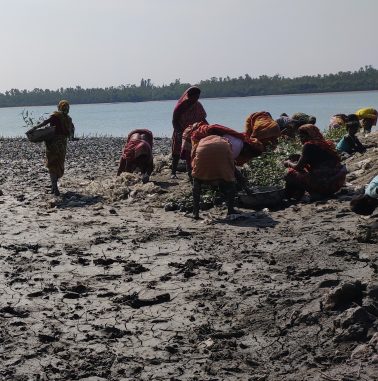
Description of the project: Frequent cyclones in the Indian state of West Bengal damage mangroves, destroy agricultural land and affect soil fertility. In this context, inland and mangrove afforestation, as well as efforts to increase community resilience are crucial. This project, carried out by indigenous women, aims to train beneficiaries in the preparation of seedlings and the planting of mangroves. This protects the area from soil erosion and reduces the intensity of climate disasters. Women are also empowered economically through an organic farming and vermicomposting programme, which provides a sustainable source of income and ensures food security for local communities.
Financially supported by: Gender CC Women for Climate Justice, supported by the German Federal Ministry for the Environment, Natural Conservation and Nuclear Safety






